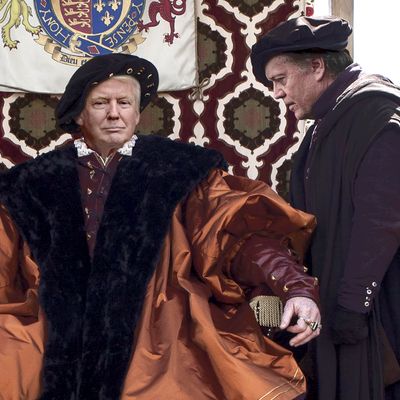
In the wake of the “travel ban” crisis engineered by presidential chief strategist Stephen Bannon and his sidekick Stephen Miller, inquiring minds are looking back at a rare moment of self-revelation by Bannon in the immediate wake of Trump’s shocking November victory. It was an interview with The Hollywood Reporter in which Bannon (interrupted occasionally by hat-in-hand supplicants like Ted Cruz) gloated over the defeat of his political adversaries in both parties and predicted a populist-nationalist realignment that would enable people like him to “govern for 50 years.”
When in appeared in mid-November, The Hollywood Reporter piece mainly drew attention for Bannon’s assertion that Trump would propose a huge infrastructure investment program that would scandalize conservatives. But in the wake of the chaos Bannon helped produce in the first days of the Trump administration, the Washington Post has taken a fresh look at the November interview and other past Bannon statements to discern his world view. What jumps out at you now is the former Breitbart executive’s understanding of his role and Trump’s. Here’s a key passage from The Hollywood Reporter article:
It is less than obvious how Bannon, now the official strategic brains of the Trump operation, syncs with his boss, famously not too strategic. When Bannon took over the campaign from Paul Manafort, there were many in the Trump circle who had resigned themselves to the inevitability of the candidate listening to no one. But here too was a Bannon insight: When the campaign seemed most in free fall or disarray, it was perhaps most on target. While Clinton was largely absent from the campaign trail and concentrating on courting her donors, Trump — even after the leak of the grab-them-by-the-pussy audio — was speaking to ever-growing crowds of 35,000 or 40,000. “He gets it; he gets it intuitively,” says Bannon, perhaps still surprised he has found such an ideal vessel.
It’s not surprising, then, that Bannon identifies with another historical figure who guided a famously erratic prince toward revolutionary goals:
“I am,” he says, with relish, “Thomas Cromwell in the court of the Tudors.”
Cromwell, for a time Henry VIII’s chancellor and chief adviser, has gained fresh fame on both sides of the Atlantic via Hilary Mantel’s trilogy of sympathetic novels, the first of which (Wolf Hall) was turned into an award-winning public-television mini-series starring Mark Rylance as Cromwell and Damian Lewis as his moody monarch. The traditional view of Cromwell was as an evil influence on Henry, exploiting the king’s sexual and financial lusts to gain vast power, leading to the despoliation of the monasteries and the vainglorious elevation of Henry into the head of both church and state. Mantel dissents by taking seriously Cromwell’s own Protestant religious convictions, and views him more as a tragic figure who was ultimately outmaneuvered by conservative rivals and ungratefully sacrificed by Henry in one of his trademark changes of direction.
But most everyone agrees Cromwell was both the architect and the victim of royal power. And that’s what makes Bannon’s identification with Cromwell fascinating, as noted by the great historian of the Tudor Reformation, Diarmaid MacCullough, interviewed by the Post for insights into the Trump Court:
The analogy — if it’s going to work — is that Bannon has his own agenda, which he will try to use Trump for, and will try to exploit the power that Trump has given him, without his master always noticing.
As Bannon surely knows, Cromwell wound up with his head on a pike, not that long after he engineered the trumped-up treason trial and execution of Queen Anne Boleyn. Though, of course, the Reformation did eventually take permanent root in England through Anne’s daughter Elizabeth.
If Trump ever turns on Stephen Bannon — perhaps, as with Henry, at the behest of powerful conservative clans who convince him the loyal underling is undermining his power — he will have a less bloody end than Cromwell. His legacy is far less certain, beyond the agony he has already inflicted on thousands of people (and the furor he probably welcomed) with the travel ban. The reversal of America’s demographic trends away from the traditional hegemony of Europeans is probably beyond Bannon’s reach, or Trump’s. But Bannon may be right that the violent cleavages he has promoted are here for a good while. There’s a reason we are still arguing about Cromwell and Henry VIII.






























